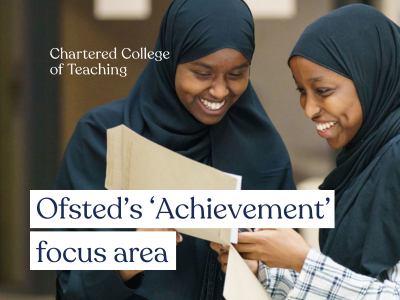Ofsted has sought feedback on its revised inspection framework. In order to inform our response to the consultation, we held a series of roundtables in March, focusing on the areas of inclusion, curriculum and attendance. These roundtables are only part of the work informing our final response and are complemented by an online survey as well as reviews of existing literature and data.
Our online roundtables were attended by Chartered College Fellows and members from a range of schools and settings, representing Early Years to Initial Teacher Training, mainstream schools to specialist provision, as well as some practitioners who are also Ofsted inspectors and Fellows who are His Majesty’s Inspectors (HMIs).
Each discussion has fed into our response to the current Ofsted and Department for Education (DfE) consultations around the inspection framework and measures proposed. It should be noted that the views summarised here are those of colleagues attending the roundtables and reflect their experiences with and opinions of the inspection system. They are not necessarily representative of the entire teaching profession or the Chartered College of Teaching as an organisation but they are important to share as part of the evidence informing discussions going forward.
In a previous blog post, we shared headline findings from our consultation. In this series, we share more detailed insights on some of the focus areas, which have also been shared with Ofsted.
This blog post focuses on the focus area of ‘Achievement’ in Ofsted’s proposed new framework.
Participants felt that the focus on ‘high expectations’ and ‘aspirations’ could have a positive impact on inclusion. However, concerns were raised about the ability to truly capture these high expectations and aspirations in a short inspection and the risk of relying on outcome data instead was discussed. This concern was echoed in all discussions. Participants felt that a focus on achievement and comparisons to national averages may continue to penalise what they considered to be truly inclusive schools, i.e. those providing a stage-, not age-focused education.
It was also raised that the focus on achievement may give little incentive to schools that currently benefit from low SEND numbers in their results. One colleague from a school that served an affluent community thought that their school would benefit from this system as their parents seek SEND diagnoses privately, but that they also have low need and the children, in turn, get good academic results. They thought that their school would likely be graded well but that this was not necessarily down to the school’s provision but rather due to parental support and their knowledge of the system. This was discussed in comparison to a school that had high SEND numbers and served a community with low socio-economic background, with parents who were not able to support the school in getting a diagnosis for their child and their results remaining below the national average.
In other words, inspections should consider the strategies schools are putting in place to support students’ learning
Participants’ call to improve the proposal:
- A focus on stage rather than age in order to achieve a truly inclusive approach to achievement.
- A focus on strategies put in place by schools to support student learning rather than a sole focus on outcomes in order to recognise the complex circumstances in which some schools operate and how these may impact national attainment data despite best efforts. This would also allow to hold schools with more affluent/lower SEND student populations and higher national outcome data to account for their inclusion practices.
- Clarification of how exactly a school’s context will be considered as part of inspections and achievement data.

